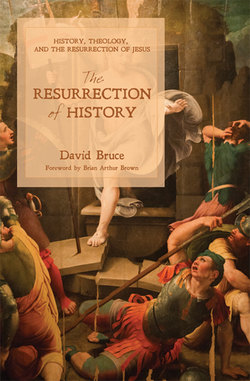Читать книгу The Resurrection of History - David Prewer Bruce - Страница 5
На сайте Литреса книга снята с продажи.
Foreword
ОглавлениеIn The Resurrection of History, David Bruce digs deeper than most New Testament scholars want to go.
Instead of naively assuming that the New Testament accounts of the resurrection of Jesus are “telling the truth” on the one hand or are just a pack of fables on the other, Bruce asks us to slow down and first ask the question, “What does it mean to say anything is historical?” He even opens the door to questions about the nature of reality, appropriate in this age of God particles and “quantum theology.”
But David Bruce maintains focus on the issue of history, a question that is actually more difficult to answer than you might think. Many throughout the centuries have tried to answer it, but Bruce deftly shows how “what we think it means for something to be historical” is wrapped up in our different understandings of God, the universe, and even the meaning of life.
Rather than throwing up his hands in futility, Bruce engages some of the best historical, philosophical, and theological minds of the previous century, believing that if we are to take Jesus seriously, and wrestle with the Church’s claims that he rose from the dead, we have to get our twenty-first-century thoughts organized. Bruce isn’t afraid to critically examine the twentieth-century ideas of Bultmann and Barth, Moltmann and von Balthasar, or Crossan and Wright and to move beyond them. The hardest thing to believe about Bruce’s exploration is how easy he makes it for readers like you and me to follow centuries of discussion about the most serious—and most controversial—claim of Christianity, enabling us to “move on” ourselves in ways that are faithful in our time.
In the end, Bruce comes out squarely on the side of the long-standing tradition of the Church as something that can and should be embraced, but only after facing the challenges head on. He argues that if Christians in our day and age want to take their own faith seriously, they will have to come to grips with what the first Christians genuinely thought and said about the resurrection of Jesus, and then seriously wrestle with how we may embrace those claims as our own, should we choose to do so. In the end, Bruce is more interested in twenty-first-century Christians speaking about their faith with integrity than “proving” the resurrection of Jesus to some imaginary neutral observer.
As a Christian minister, I have used David’s Jesus 24/7 series in my congregations, delighted by his ability to communicate the most subtle of concepts in the simplest, clearest way possible. As the author and editor of the Three Testaments series, I have been able to count on Bruce to represent the broader Christian tradition of the interreligious context in a manner that is not only faithful to the teachings of the church, but at the same time respectful of the beliefs of others. Recent Jewish commentary (The Resurrection of Jesus: A Jewish Perspective, by Pinchas Lapide) and traditional Islamic writings (questioning the crucifixion but not necessarily the resurrection) provide their own oeuvres on the profundities addressed by David Bruce, appropriate to interfaith conversations of a mutually respectful nature, which is becoming a twenty-first-century hallmark.
Whether you are Protestant or Catholic, liberal or conservative, or even if you are from another religious tradition “looking in” on what Christians are saying, you will find yourself challenged to go deeper into your own values, your own assumptions, and your own personal faith by letting David Bruce guide you in pondering the pivotal Christian claim that “Jesus Christ is risen indeed.”
Brian Arthur Brown
Contributing editor, Three Testaments: Torah, Gospel and Quran
